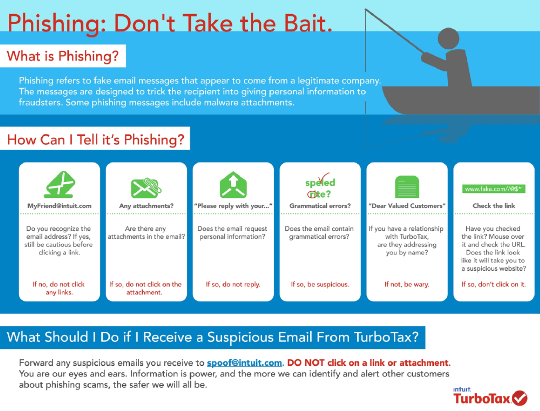Intuit Offers 6 Tips to Avoid Being Lured into Identity Theft
Mountain View, California based business and personal financial management software developers Intuit warn that it’s “phishing” season, and they’re not referring to the lazy-afternoon-on-the-lakeshore sort of fishing, but about email phishing. That’s the kind where scammers send you convincingly real-looking – but entirely bogus – email messages in attempting to persuade you to reveal personal information.
Intuit notes that phishing activity is ramping up, especially during tax season, as criminals use the company’s Intuit and TurboTax brand names in attempts to steal your identity, get your personal information, and file fake tax returns in your name.
Intuit Inc.says it’s is doing its best to stop these digital predators and protect its customers. For example, when one of these scams involving its products is detected, the company posts an alert at security.intuit.com to help people separate the fact from fake. The site includes advice on how to protect your identity and your computer from criminals.
Intuit also has a series of tips that can help you avoid taking the bait in a suspicious email. They note that scammers are very clever, typically copying logos, language and images from legitimate websites in order to make their emails look like authentic business communications. However, they also often leave telltale clues that can tip you off to their true motives.
Here’s what to look for:
• Check the sender’s email address. Do you recognize it? If yes, still be cautious before clicking a link. If no, do not click any links.
• Be suspicious of attachments. Are there any? Don’t click on attachments that end with .exe, .bat, .com, .vbs, .reg, .msi, .pif, .pl, or .php. These are executable files that could launch a virus or give an outsider access to your computer. Even if the file does not contain one of the above mentioned extensions, be cautious about opening it. Contact the sender to verify its contents.
• Protect your identity. Does the email request personal information? If so, do not reply.
• Check the spelling. Does the email contain grammatical errors? This is one area where phishers, who while clever in not good ways, are more likely than not to be poorly educated. Anyone can make the odd typo, but they are rare in real corporate mailings hat are vetted and proofread before posting. Consequently spelling errors are a red flag.
• Let’s get personal. If you have a relationship with the company, do they address you by name? If not, they may not know you.
Check any links. Mouse over a link, but don’t click it, and check the URL. Does it look legitimate or does it look like it will take you to a different website.
• And what if you get a suspicious email that looks like it could be from Intuit? Forward it to spoof@intuit.com. Do not click on a link or attachment. You can protect yourself, and others from being lured. Information is power, and by working together to identify and alert other customers about phishing scams, the safer everyone will be.
For more information about Intuit and its software solutions, visit:
http://www.intuit.com

